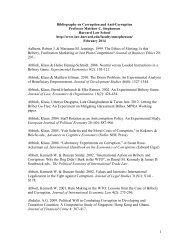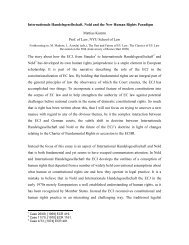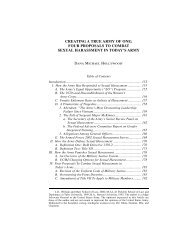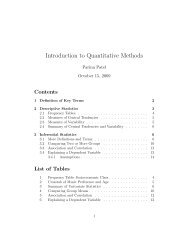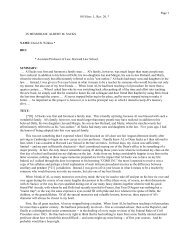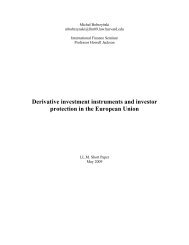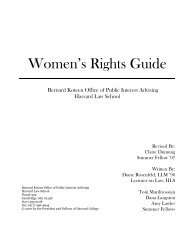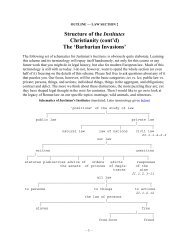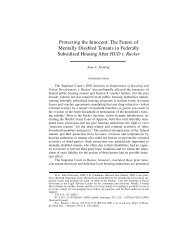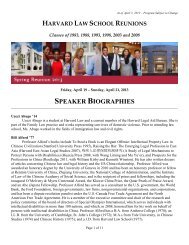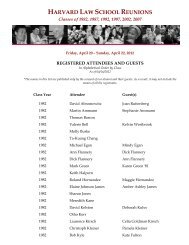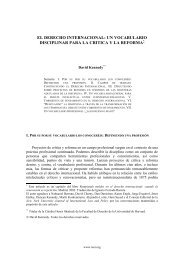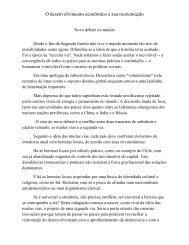Patients as Consumers - Harvard Law School
Patients as Consumers - Harvard Law School
Patients as Consumers - Harvard Law School
Create successful ePaper yourself
Turn your PDF publications into a flip-book with our unique Google optimized e-Paper software.
MLR 106-4 Edit Format Document Hall Mich L Rev.doc<br />
understand how uninsured services are priced. <strong>Patients</strong>, doctors,<br />
hospitals, illnesses, and treatments vary so enormously that<br />
generalizing about medical pricing is a fools’ game. But play it we<br />
must. Our generalization: the patient’s illness, the patient’s<br />
relationship with the physician, and the patient’s disadvantages in<br />
selecting physicians combine to make it miserably difficult for<br />
patients to shop skillfully for fair prices.<br />
1. The Effects of Illness on the Patient <strong>as</strong> Consumer<br />
Being a consumer is harder than it looks, especially when buying<br />
unfamiliar things in unfamiliar situations. <strong>Consumers</strong> chronically<br />
inform themselves laxly, understand their preferences hazily, and<br />
analyze their choices carelessly. An extensive and expanding law of<br />
consumer protection responds to these frailties with a varied array of<br />
doctrines. 24 For example, it forbids unduly dangerous and even unduly<br />
disadvantageous sales—<strong>as</strong> usury laws do. It relieves people of some<br />
improvident contracts, if only through a locus poenitentiae. It<br />
requires warnings about many products—truth-in-lending laws being a<br />
prime example (of this popular if bootless technique). It provides<br />
remedies for harms done by defective products.<br />
What, then, of the patient <strong>as</strong> consumer? All the problems of<br />
buying unknown things in foreign situations afflict the patient. But<br />
in addition, illness can cripple the patient <strong>as</strong> consumer. How?<br />
Illness disables. Sick bodies rebel, and the ill are defeated.<br />
Illness pains. The faltering body hurts. Sometimes intensely;<br />
sometimes perpetually. Even “a little loss of animal toughness, a<br />
little irritable weakness and descent of the pain-threshold, will<br />
bring the worm at the core of all our usual springs of delight into<br />
full view, and turn us into melancholy metaphysicians.” 25<br />
Illness exhausts. The sick lose the physical strength and<br />
emotional fortitude to keep houses clean, families cared for,<br />
friendships alive, and employers satisfied. They struggle even to rise<br />
from bed, brush their teeth, or make breakf<strong>as</strong>t.<br />
2001); River Park Hosp., Inc. v. BlueCross BlueShield of Tenn., Inc., 173<br />
S.W.3d 43, 60 (Tenn. Ct. App. 2002); H.E. Butt Grocery Co. v. Rencare, Ltd.,<br />
No. 04-03-00190-CV, 2004 WL 199272, at *1 (Tex. Ct. App. Feb. 4, 2004).<br />
24. See generally Am. Bar Ass’n, The American Bar Association Guide<br />
to Consumer <strong>Law</strong> (1997), available at<br />
http://www.abanet.org/publiced/practical/books/consumer/home.html; Andrew L.<br />
Sandler et al., Consumer Financial Services (2006); Jonathan Sheldon &<br />
Carolyn L. Carter, Unfair and Deceptive Acts and Practices (6th ed. 2004).<br />
25. William James, The Varieties of Religious Experience 140 (rev.<br />
reprint 1902).<br />
U of M <strong>Law</strong> <strong>School</strong> Publications Center, November 2, 2007, 12:51 PM<br />
Page 8



